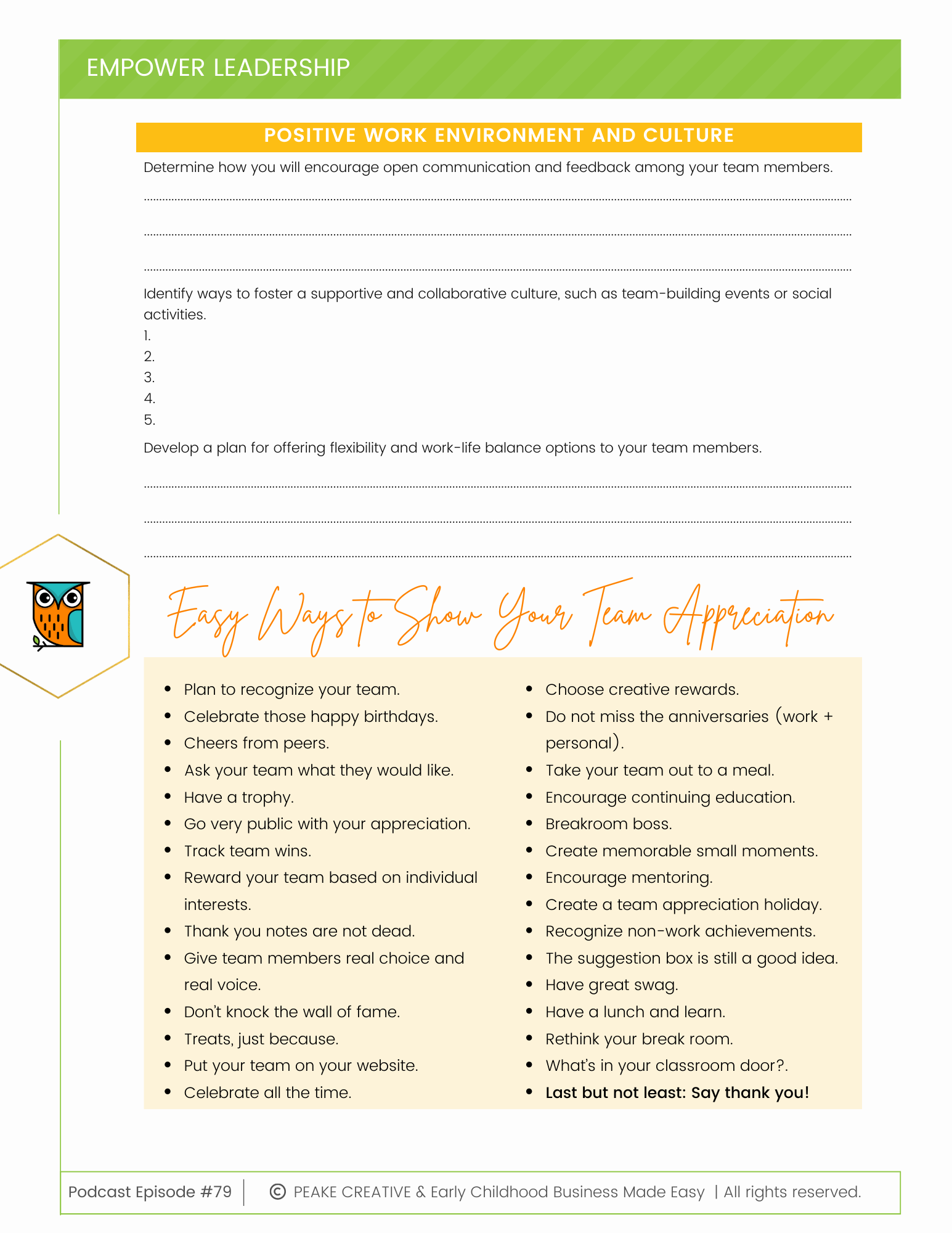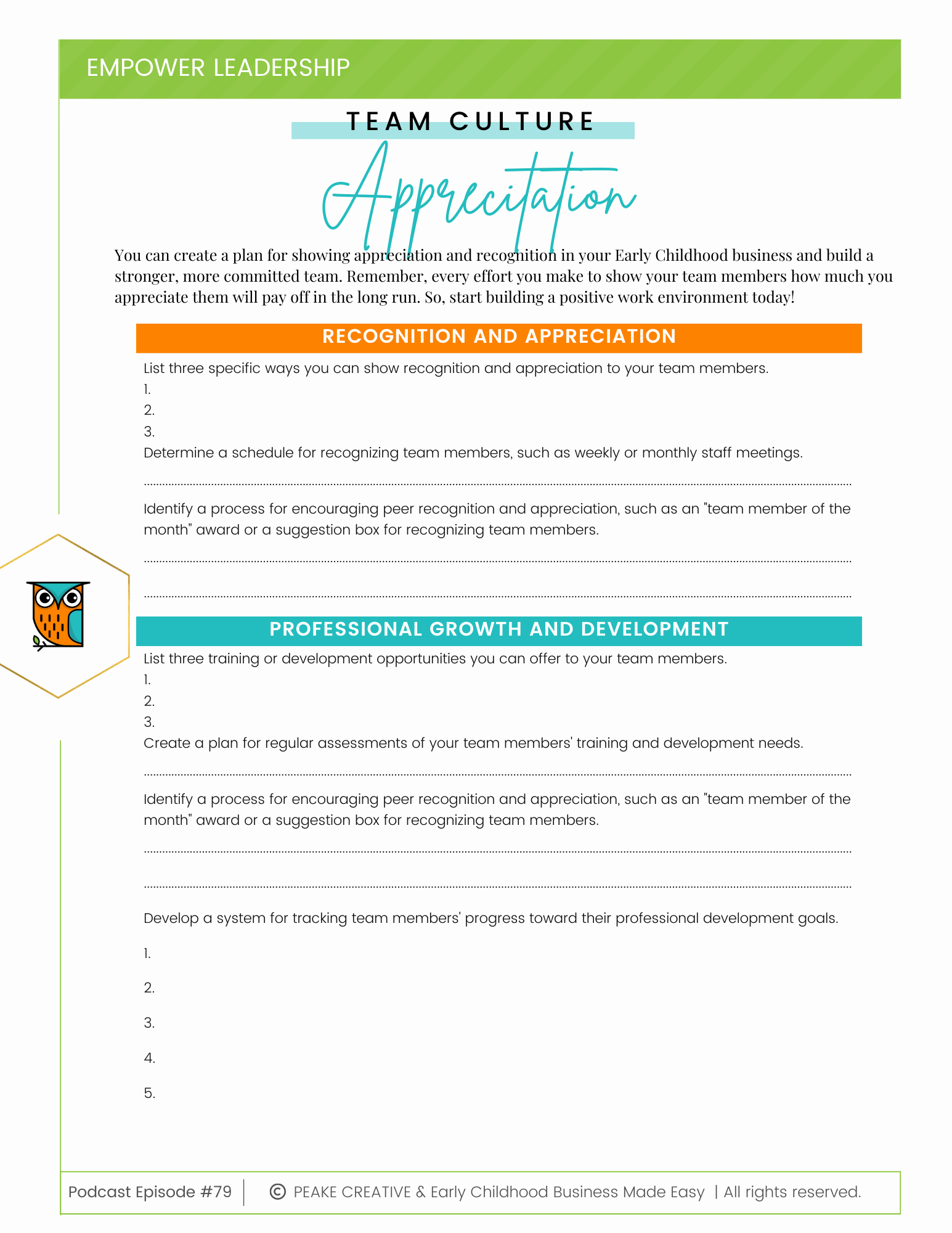Unlocking the Power of Appreciation: How Early Childhood Businesses Can Boost Retention and Build a Stronger Team
Are you struggling to retain your best employees and keep turnover rates low in your Early Childhood business?
Do you want to create a work environment where your team members feel appreciated and valued?
As an Early Childhood business operator, you know how challenging it can be to build a strong team. You need dedicated, skilled, and motivated employees to provide the high-quality care that your clients expect. However, retaining those employees can be even more challenging, especially in a competitive job market.
That's why it's essential to show your team members how much you appreciate their hard work and dedication. By creating a culture of appreciation, you can increase employee satisfaction, improve morale, and reduce turnover rates. In this episode, we're going to provide guidance and actionable strategies on how you can show your appreciation to your team.
We are going to provide guidance and actionable strategies on how you can show your appreciation to your team. How you can:
Recognition and Appreciation
Professional Growth and Development
Positive Work Environment and Culture
Recognition and Appreciation
We will discuss specific ways to show recognition and appreciation to your team members, the benefits of doing so, and how to implement recognition and appreciation efforts in your Early Childhood business. We'll share case studies of successful implementation and provide step-by-step instructions for creating a recognition and appreciation plan.
Professional Growth and Development
We'll discuss opportunities for professional growth and development in Early Childhood education, the benefits of offering professional development opportunities to your team members, and how to provide professional development opportunities. We'll share case studies of successful implementation and provide step-by-step instructions for creating a professional development plan.
Positive Work Environment and Culture
We'll discuss examples of positive workplace culture and environment, the benefits of creating a positive work environment and culture, and how to create a positive work environment and culture in your Early Childhood business. We'll share case studies of successful implementation and provide step-by-step instructions for creating a positive work environment and culture.
10 Ways to Show Appreciation in Your Early Childhood Business
Take the time to get to know your team members on a personal level. Learn about their interests, hobbies, and families. When you show an interest in someone's life outside of work, you demonstrate that you care about them as a person, not just an employee.
Make sure your team members know that you value their contributions. This could be in the form of verbal recognition, written thank-you notes, or public acknowledgment of their achievements. Make sure your appreciation is specific and sincere, and that you're recognizing both big and small accomplishments.
Create a positive work environment that supports work-life balance. Offer flexible scheduling, allow remote work options, and provide generous vacation time. By giving your team members more control over their schedules and work-life balance, you show that you value their personal needs and well-being.
Provide opportunities for professional growth and development. As a leader, it's your responsibility to provide your team with the tools and resources they need to succeed. This could be in the form of training sessions, conferences, or mentorship programs. When you invest in your team members' careers, you show them that you value their skills and want to help them succeed.
Offer flexible work arrangements. This could be in the form of telecommuting, flexible scheduling, or extended vacation time. When you give your team members more control over their work-life balance, you show them that you respect their time and trust them to get their work done.
Don't forget the power of a simple thank you. When someone does something well, take the time to acknowledge and appreciate their efforts. Whether it's a verbal thank you, a handwritten note, or a small gift, these gestures can go a long way in making your team members feel valued.
Recognize the importance of setting clear goals and expectations for your team. This involves communicating your vision for the business, defining specific objectives, and outlining the roles and responsibilities of each team member. When everyone is clear on what they need to accomplish, they can work together more efficiently and effectively.
Understand the power of accountability. As a leader, you need to hold yourself and your team members accountable for achieving your goals and upholding your values. This means setting clear expectations, providing regular feedback, and addressing any issues that arise in a timely and constructive manner.
Whenever possible, provide competitive compensation and benefits. Make sure your team members are paid fairly for their work and offer benefits such as health insurance, retirement plans, and paid time off. When you invest in your team members' financial stability, you show that you value their long-term commitment to your business.
Make sure you're providing a supportive and collaborative work culture. Emphasizes the value of feedback and recognition. Encourage open communication, provide regular feedback, and create opportunities for team building and bonding. When your team members feel supported and connected to their colleagues, they're more likely to feel a sense of belonging and commitment to your business. It can boost their motivation and sense of purpose. This can be done through one-on-one meetings, performance reviews, or simply thanking team members for their hard work.
Final Thoughts
Making your team feel appreciated is a critical aspect of effective leadership. By investing in your team members' personal and professional growth, offering flexible work arrangements, and acknowledging their efforts with a simple thank you, you create a positive work culture where people feel supported and encouraged. Remember, when your team members feel valued, they'll be more engaged and motivated to do their best work, leading to a more successful and thriving business.
Resources
If you're looking for more help when it comes to developing a successful Early Childhood business, including gaining more time+freedom without the chaos and overwhelm, please check out our Shine Membership and CEO Mentorship programs. We are here to help you reach your goals!
Be sure to download our free resource, Team Appreciation Planning Worksheet to help you brainstorm your very own Team Appreciation strategies
Work + Life Planning Bundle
This Work+Life Planning Strategy Bundle helps you Reduce Chaos, Break Free From Overwhelm & Take Back Hours Of Your Time every single week!



